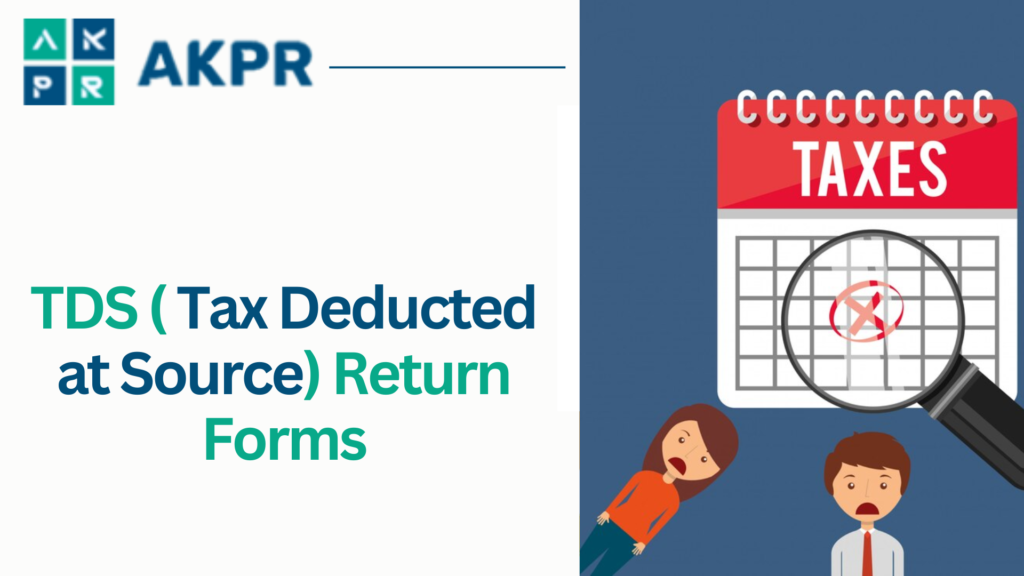Tax Deducted at Source (TDS) is a critical mechanism in India’s taxation system that ensures timely tax collection by deducting a portion of taxable payments at the source. Filing TDS returns is a mandatory quarterly obligation for individuals and entities deducting tax. However, the type of TDS return form required depends on the nature of the payment and the recipient.

In this blog, we provide a detailed guide on the types of TDS return forms, their purposes, and the key compliance requirements, ensuring you have a clear understanding of the process.
What is TDS?
TDS, or Tax Deducted at Source, is a system where a portion of the payment is deducted as tax before it is made to the recipient. The deductor is responsible for depositing this tax with the government and filing TDS returns to report the details.
Types of TDS Return Forms
1. Form 24Q: TDS on Salaries
- Purpose: Applicable for reporting TDS on payments such as interest, rent, commission, professional fees, etc., made to Indian residents.
- Details Included: Information about payments made, TDS deducted, and PAN details of payees.
- Frequency: Filed quarterly.
- Who Should File?: Individuals or entities making payments to residents.
2. Form 26Q: TDS on Payments Other than Salary
- Purpose: Applicable for reporting TDS on payments such as interest, rent, commission, professional fees, etc., made to Indian residents.
- Details Included: Information about payments made, TDS deducted, and PAN details of payees.
- Frequency: Filed quarterly.
- Who Should File?: Individuals or entities making payments to residents.
3. Form 27Q: TDS on Payments to Non-Residents
- Purpose: This form is used for reporting TDS deducted on payments made to non-resident Indians (NRIs) and foreign entities. These include interest, dividends, or any other income subject to TDS.
- Details Included: Payment details, deductee’s country of residence, and tax treaty benefits if applicable.
- Frequency: Filed quarterly.
- Who Should File?: Businesses or individuals making payments to non-residents.
4. Form 27EQ: Tax Collected at Source (TCS)
- Purpose: Used for reporting tax collected at source on transactions like the sale of goods, lease, or licensing.
- Details Included: Information about the transaction, tax collected, and buyer’s PAN details.
- Frequency: Filed quarterly.
- Who Should File?: Sellers collecting tax from buyers on specified transactions.
TDS Return Filing Due Dates
Adhering to the filing deadlines for TDS returns is crucial to avoid penalties. Below are the due dates:
| Quarter | Period | Due Date |
| 1st Quarter | April – June | 31st July |
| 2nd Quarter | July – September | 31st October |
| 3rd Quarter | October – December | 31st January |
| 4th Quarter | January – March | 31st May |
These dates apply to all TDS return forms, ensuring uniformity across different types.
Consequences of Late Filing
Failing to file TDS returns within the due dates can lead to penalties and additional charges, including:
- Late Filing Fee: ₹200 per day until the return is filed, subject to a maximum amount equivalent to the TDS amount.
- Penalty Under Section 271H: A penalty ranging from ₹10,000 to ₹1,00,000 can be levied for non-filing or incorrect filing.
- Interest on Late Payment: Interest may also apply for delays in depositing TDS with the government.
Importance of Choosing the Right Form
Filing the correct TDS return form is essential for:
- Avoiding discrepancies in tax filings.
- Ensuring compliance with tax regulations.
- Preventing penalties due to filing errors.
Each form serves a specific purpose, and understanding these distinctions helps streamline your compliance efforts.
Ensuring Compliance Through Accurate TDS Return Filing
Filing TDS returns is an essential aspect of staying compliant with Indian tax laws. Whether you’re an employer, business owner, or individual making payments subject to TDS, selecting the correct return form and adhering to filing deadlines is crucial for smooth tax operations. Timely and accurate TDS filing not only helps avoid penalties but also ensures transparency and efficiency in your financial dealings.
Stay informed, consult tax professionals when necessary, and ensure that your TDS returns are filed accurately and on time to maintain full compliance with the tax authorities.
Feel Free to Contact AKPR for Any Assistance
At AKPR, we understand the complexities of TDS compliance and ensure seamless tax operations for our clients. Our team of experienced professionals provides comprehensive guidance on selecting the correct TDS return forms, accurate calculations, and timely filings.
Why Partner with AKPR?
- Expert Guidance: Benefit from expert advice tailored to your unique business needs.
- Timely Filing: Ensure all TDS returns are filed on time, avoiding penalties and interest.
- Compliance Assurance: Stay fully compliant with ever-changing tax laws and regulations.
- End-to-End Support: From understanding requirements to submission, we handle everything.
Whether you’re an employer filing Form 24Q or a business handling payments to non-residents with Form 27Q, AKPR ensures precision and compliance every step of the way. Partner with us for a hassle-free TDS compliance experience!
Looking for CA Firm in India for TDS return filing?
CA Firm in Mumbai | CA Firm in Parel | CA Firm in Andheri | CA Firm in Bandra | CA Firm in Nariman Point | CA Firm in Ghatkopar | CA Firm in Dadar | CA Firm in Bandra Kurla Complex